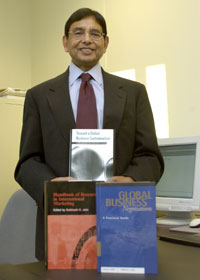|
This is an archived article.
For the latest news, go to the Advance Homepage
For more archives, go to the Advance Archive/Search Page. |
||
|
Jain Boosts Global Business, Personal
Unions, environmentalists, and other opponents of the North American Free Trade Act (NAFTA) and the continuing globalization of business should be warned, says Subhash Jain: resistance is futile.
Jain, head of the Center for International Business and Education (CIBER) in the School of Business, argues in a new book, Toward a Global Business Confederation: A Blueprint for Globalization, that the world's multinational corporations - and only the multinational corporations - are positioned to bring prosperity and growth to all people of the world. "In the not too distant future, multinational corporations will play a more dominant role in the world than they now play," Jain says with approval. "People want jobs. They want the good life, and the multinationals can deliver. They develop the new technologies that make life better, which they sell all over the world. They do all the hiring. Why do (governments) need to say where the work is done, where buttons are made?" Jain concedes, however, that the world's nation-states should play a role in the formation of this new world order, and that the multinational corporations, far from acting unilaterally, should create a Global Business Confederation, whose members would design rules and regulations that encourage the generation of global prosperity in a manner responsive to cultural, social, and humanitarian concerns. Jain's book is part of a rare trifecta for the 27-year UConn veteran. He also published a book in October - Global Business Negotiations: A Practical Guide - and another in November - A Handbook of Research in International Marketing. The book on creating a global business confederation was published in December. Jain also is compiling research for another book, which will discuss the impact of homeland security on global business, and he's preparing to host, through CIBER, an international conference in April on culture, language, business, and technology, which is expected to bring more than 200 scholars to Stamford. He also hosted a conference in October on the role of multinational corporations in reducing global poverty, a topic reflected in the most recent book. Using a cliché from the Reagan era, Jain maintains that a corporate presence in economically depressed countries will have a 'trickle down effect'. "As corporations do more business in other countries, those countries receive more money. As they create an upper strata (people with money), those people no longer want to plow snow, mow grass. They want to eat out. They want a chauffeur. They want their house cleaned. So more jobs are created, they spend their new money and, eventually, an infrastructure is created so people can communicate, and so on," Jain says. From there, an entrepreneurial class is created, he says, pointing to a number of businessmen in India who have opened shops that rent time on cell phones. "Now, the farmer who has to accept the local price for his crop can call a store owner in another town, and negotiate a higher price," Jain says. As for American's fears that globalization takes jobs out of America, he says the reverse is true, too. "In the 1980s, when Toyotas and Hondas became the best-selling cars in America, people said we were losing jobs to Japan. Well, Toyota is now the third largest automaker in America. If that progress continues, within five years Toyota will be larger than Ford. Those are American jobs they're creating. There's always a give and take. "If jobs keep going to China, that means the Chinese have more money to spend here - on tourism, education, technology," he argues. Similarly, Jain says, a larger workforce in other countries will find its voice and demand more, although he says what may be a necessary benefit to American workers may not even be on the radar screen in Bangladesh. That and other cultural differences are what led to Jain's book on global business negotiations, which he refers to as a "textbook" for business executives trying to broker deals in other countries. "I don't focus on particular countries, but take a general look at how attitudes, culture, matter," he says. "I discuss preparations, when to be formal and when not. Americans tend to be impatient. Few other countries are." Jain's research and programs have been funded for nine years through CIBER. In 1995, Jain and the School of Business were awarded $400,000 to establish the center. The grant was renewed in 1998 for $660,000, and again in 2001, for $380,000 per year. |

